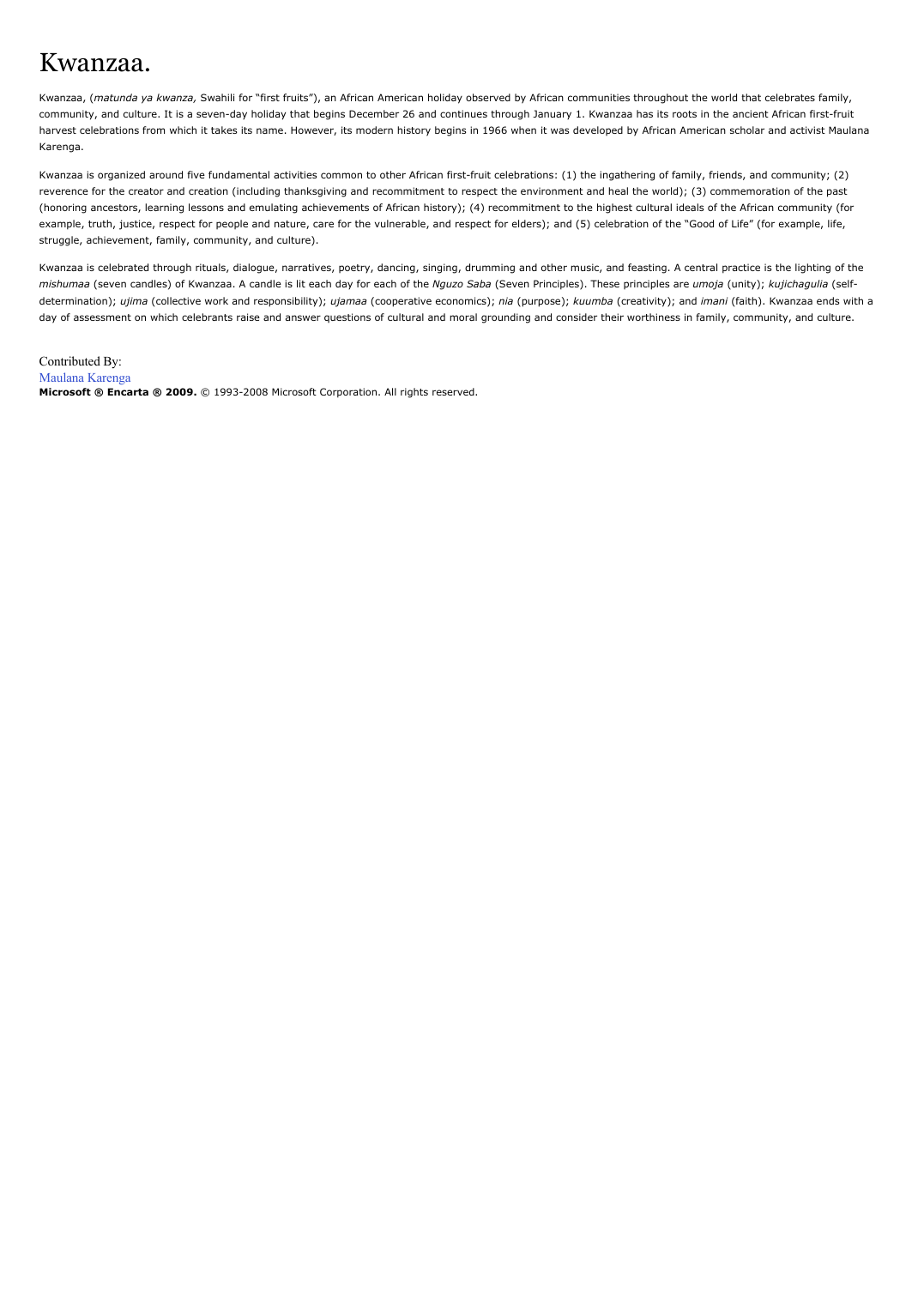Kwanzaa.
Publié le 06/12/2021

Extrait du document
Ci-dessous un extrait traitant le sujet : Kwanzaa.. Ce document contient 285 mots. Pour le télécharger en entier, envoyez-nous un de vos documents grâce à notre système d’échange gratuit de ressources numériques ou achetez-le pour la modique somme d’un euro symbolique. Cette aide totalement rédigée en format pdf sera utile aux lycéens ou étudiants ayant un devoir à réaliser ou une leçon à approfondir en : Echange
Kwanzaa.
Kwanzaa, (matunda ya kwanza, Swahili for "first fruits"), an African American holiday observed by African communities throughout the world that celebrates family,
community, and culture. It is a seven-day holiday that begins December 26 and continues through January 1. Kwanzaa has its roots in the ancient African first-fruit
harvest celebrations from which it takes its name. However, its modern history begins in 1966 when it was developed by African American scholar and activist Maulana
Karenga.
Kwanzaa is organized around five fundamental activities common to other African first-fruit celebrations: (1) the ingathering of family, friends, and community; (2)
reverence for the creator and creation (including thanksgiving and recommitment to respect the environment and heal the world); (3) commemoration of the past
(honoring ancestors, learning lessons and emulating achievements of African history); (4) recommitment to the highest cultural ideals of the African community (for
example, truth, justice, respect for people and nature, care for the vulnerable, and respect for elders); and (5) celebration of the "Good of Life" (for example, life,
struggle, achievement, family, community, and culture).
Kwanzaa is celebrated through rituals, dialogue, narratives, poetry, dancing, singing, drumming and other music, and feasting. A central practice is the lighting of the
mishumaa (seven candles) of Kwanzaa. A candle is lit each day for each of the Nguzo Saba (Seven Principles). These principles are umoja (unity); kujichagulia (selfdetermination); ujima (collective work and responsibility); ujamaa (cooperative economics); nia (purpose); kuumba (creativity); and imani (faith). Kwanzaa ends with a
day of assessment on which celebrants raise and answer questions of cultural and moral grounding and consider their worthiness in family, community, and culture.
Contributed By:
Maulana Karenga
Microsoft ® Encarta ® 2009. © 1993-2008 Microsoft Corporation. All rights reserved.
Kwanzaa.
Kwanzaa, (matunda ya kwanza, Swahili for "first fruits"), an African American holiday observed by African communities throughout the world that celebrates family,
community, and culture. It is a seven-day holiday that begins December 26 and continues through January 1. Kwanzaa has its roots in the ancient African first-fruit
harvest celebrations from which it takes its name. However, its modern history begins in 1966 when it was developed by African American scholar and activist Maulana
Karenga.
Kwanzaa is organized around five fundamental activities common to other African first-fruit celebrations: (1) the ingathering of family, friends, and community; (2)
reverence for the creator and creation (including thanksgiving and recommitment to respect the environment and heal the world); (3) commemoration of the past
(honoring ancestors, learning lessons and emulating achievements of African history); (4) recommitment to the highest cultural ideals of the African community (for
example, truth, justice, respect for people and nature, care for the vulnerable, and respect for elders); and (5) celebration of the "Good of Life" (for example, life,
struggle, achievement, family, community, and culture).
Kwanzaa is celebrated through rituals, dialogue, narratives, poetry, dancing, singing, drumming and other music, and feasting. A central practice is the lighting of the
mishumaa (seven candles) of Kwanzaa. A candle is lit each day for each of the Nguzo Saba (Seven Principles). These principles are umoja (unity); kujichagulia (selfdetermination); ujima (collective work and responsibility); ujamaa (cooperative economics); nia (purpose); kuumba (creativity); and imani (faith). Kwanzaa ends with a
day of assessment on which celebrants raise and answer questions of cultural and moral grounding and consider their worthiness in family, community, and culture.
Contributed By:
Maulana Karenga
Microsoft ® Encarta ® 2009. © 1993-2008 Microsoft Corporation. All rights reserved.
↓↓↓ APERÇU DU DOCUMENT ↓↓↓


